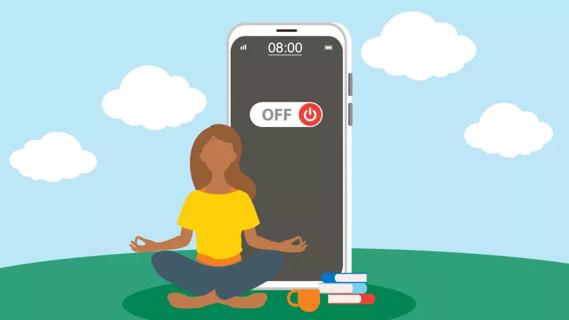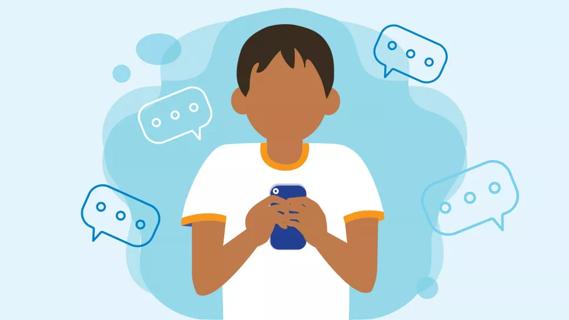It can affect your child’s development, but not in a way you might think

Today, technology is changing our world. You could argue it’s even changing our children.
Advertisement
Cleveland Clinic is a non-profit academic medical center. Advertising on our site helps support our mission. We do not endorse non-Cleveland Clinic products or services. Policy
Kids often revel in digital media, especially with gaming and social media. The technology is enticing and full of color and interactivity — and while this may offer some benefits, it also raises concerns and questions.
The main question bubbling up, especially for exasperated parents trying to break through the hold of screens and devices: Can too much screen time make children more prone to the symptoms of attention-deficit/hyperactivity disorder (ADHD)?
ADHD, while a common disorder, has a lot of nuance to it. It doesn’t simply mean that someone gets distracted easily. Pediatric behavioral health specialist Michael Manos, PhD, explains that ADHD is a genetic predisposition characterized by specific hyperactive and impulsive behaviors involving physical differences in the brain.
According to Dr. Manos, there’s still not enough evidence to support a clear-cut cause-and-effect link between heightened technology use in kids and ADHD. But technology use does have a behavioral impact. “Frequent use of technology affects how we behave and relate with one another,” he adds.
Some of the biggest questions on parents’ and caregivers’ minds when they see their kids playing hours of video games or staring at their iPads is: Can frequent use of digital media reduce my child’s attention span? Can it make them more easily distracted?
Advertisement
A 2018 study aimed to explore this question. The study looked at 2,587 high school students who had not been diagnosed with ADHD. Students were surveyed on how much time they spent on digital media, including social media.
Researchers found that the students who reported using digital media many times a day were more likely than their peers to show these symptoms:
These results do seem to speak volumes, but Dr. Manos urges us not to jump to conclusions. “Does this mean that too much time gaming or commenting on Facebook can give kids ADHD? Absolutely not. But these activities may cause symptoms that are similar to ADHD, even though they can’t cause ADHD itself,” he says.
The keyword here is similar. In other words, frequent digital media use can bring out latent symptoms or create behaviors that look like ADHD. The problem isn’t digital media itself, but that it produces a dizzying burden on a person’s attention.
So, while social media and device use may not directly cause ADHD, that doesn’t mean it doesn’t have an effect on your child’s attention span and overall development. And, as Dr. Manos points out, our attention span is greatly tied to how we relate and socialize with others.
“As children increasingly relate to each other through digital media, including social media and video games, it calls into question how we communicate on a human level,” he adds.
He also notes that while things like video games do help with team building and problem-solving, they shouldn’t be the only kind of interaction kids are having. Too much time on devices means less time having real face-to-face communication, where facial expression, voice and body language all come into play.
“These are the nuances of understanding relationships,” Dr. Manos says.
There’s also a concern over kids developing a harmful connection or “bond” to their devices. This can manifest through separation anxiety when they’re forced to take a break from a computer game or their social media feed. And then — well, cue the tears.
“It’s fascinating that some children will actually develop severe tantrums if a screen is taken away,” says Dr. Manos. He adds that if you’re noticing your child having behavior problems tied to their devices, that’s your sign to create limits (more on that in a moment).
Even when their screens aren’t taken away, Dr. Manos also explains how increased social media use can cause a sort of innate anxiety and irritability in kids — always checking their phones and anticipating the next notification.
Advertisement
“Every time your computer chimes, your phone beeps or you get an email, text or notification, your first inclination is to respond,” Dr. Manos acknowledges.
He uses the example of a child in the classroom. Let’s say, despite the school rules, the child has a phone in their pocket, set on silent. They can feel it buzzing, so they hold it under their desk to look at it.
“This is an immediate draw on his attention, away from whatever he was learning. It creates a high level of stimulation with alerts and notifications and advertisements that can cause teens to have more difficulty focusing and staying on task,” Dr. Manos says.
Exposure to digital media should be limited for everyone, though it varies by age. For young children, it’s even more important to limit the use of technology because it has profound effects on how their brains develop.
Current recommendations from the American Academy of Pediatrics (AAP) call for no digital media use for children ages 3 and under, and no more than one hour a day for school-aged children. When it comes to older teens, Dr. Manos says it’s essential for parents to set reasonable limits that work for their family.
Of course, there are also benefits to digital media use. For example, kids who find education tedious with pencil and paper may find they can learn more easily on a computer. Technology also offers a quick, efficient way to communicate and can provide engaging activities. There are even prescription-only video game programs specifically made to help improve focus for young children with ADHD. But the key is making sure your kids understand balance and context in terms of what they’re watching and engaging with.
Advertisement
“When parents actually sit down with the child and participate in screen time, that has been demonstrated to be beneficial,” says Dr. Manos. “And it can assist parents in strengthening their bonds with their children. So when parents are sitting there and interacting with the child and the screen, then that can be a benefit.”
In addition, he says parents are sometimes unaware of how their own digital media use affects the quality of their interactions with their children.
“I remember one day when my wife and I were out for breakfast. There was a family at the table next to us with a baby who was only about 6 to 7 months old, cooing to her mother, lifting her arms. But the parents were both on their phones while the baby was putting so much effort forth trying to get their attention. She didn’t and couldn’t.”
For parents, becoming aware of your own media and device usage can help model good practices to your children.
“Children learn empathy with others in real-life interactions, not in screen time that is programmed interaction,” says Dr. Manos. “Empathy comes from real people engaging with real people. And, of course, people do not fit a pre-programmed script.”
He says it’s a challenge in today’s world to restrict media and offers this tip to parents: “Be consistent. Also, work with your child to come to an agreement with your child about what the parameters are.”
Advertisement
To hear more about ADHD from Dr. Manos, listen to the Health Essentials Podcast episode, “ADHD and Kids.” New episodes of the Health Essentials Podcast publish every Wednesday.
Learn more about our editorial process.
Advertisement

It isn’t a recognized mental health disorder, but research shows that problematic social media use can negatively affect your mental health, self-esteem and sleep

Too much blue light, especially from digital sources, may lead to eye strain and computer vision syndrome

When done in excess, watching TV can disrupt your sleep and lead to physical inactivity and social isolation

Imagination, completing tasks and social interactions are all key benefits for your brain

They’re fun to watch, but medical TV shows are often more hype than reality — and you shouldn’t rely on them for factual medical information

Embrace mindfulness and practice checking your phone consciously, not compulsively

Identify your triggers, set ground rules for your break and start practicing mindfulness

Too much screen time and unrealistic expectations and perceptions and can lead to an increased risk of anxiety and depression

The tropical fruit is a good source of antioxidants and vitamin C

Most people fall asleep within 10 to 20 minutes, but if your experience is different, adjusting your sleep schedule may help

Exploring your hidden side can lead to better understanding of what makes you tick